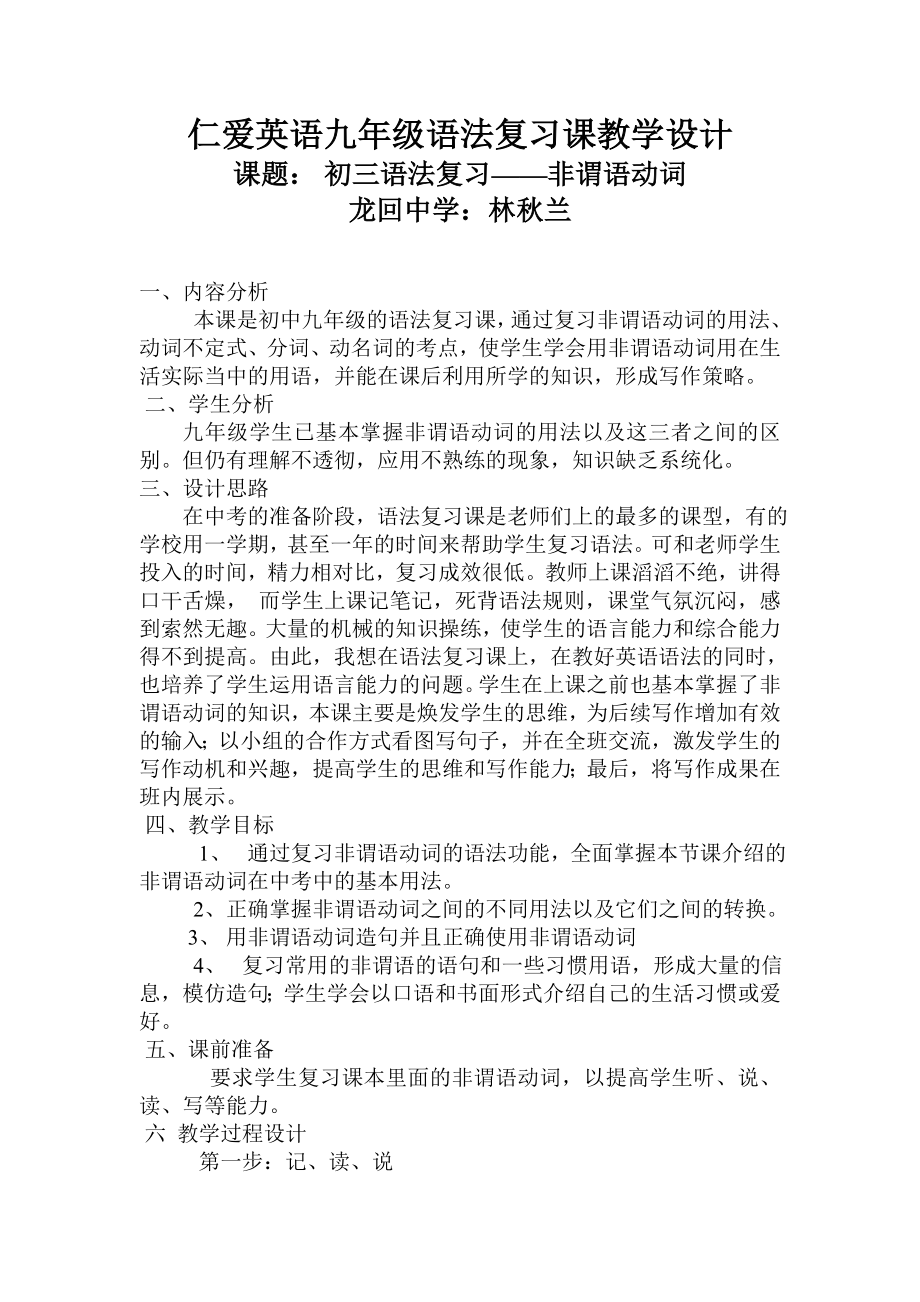《仁愛(ài)英語(yǔ)九年級(jí)語(yǔ)法復(fù)習(xí)課教學(xué)設(shè)計(jì)非謂語(yǔ)動(dòng)詞》由會(huì)員分享���,可在線閱讀��,更多相關(guān)《仁愛(ài)英語(yǔ)九年級(jí)語(yǔ)法復(fù)習(xí)課教學(xué)設(shè)計(jì)非謂語(yǔ)動(dòng)詞(4頁(yè)珍藏版)》請(qǐng)?jiān)谘b配圖網(wǎng)上搜索。
1�、仁愛(ài)英語(yǔ)九年級(jí)語(yǔ)法復(fù)習(xí)課教學(xué)設(shè)計(jì)課題:初三語(yǔ)法復(fù)習(xí)非謂語(yǔ)動(dòng)詞龍回中學(xué):林秋蘭一、內(nèi)容分析本課是初中九年級(jí)的語(yǔ)法復(fù)習(xí)課���,通過(guò)復(fù)習(xí)非謂語(yǔ)動(dòng)詞的用法��、動(dòng)詞不定式��、分詞��、動(dòng)名詞的考點(diǎn)�����,使學(xué)生學(xué)會(huì)用非謂語(yǔ)動(dòng)詞用在生活實(shí)際當(dāng)中的用語(yǔ)����,并能在課后利用所學(xué)的知識(shí),形成寫作策略�。二、學(xué)生分析九年級(jí)學(xué)生已基本掌握非謂語(yǔ)動(dòng)詞的用法以及這三者之間的區(qū)別�����。但仍有理解不透徹����,應(yīng)用不熟練的現(xiàn)象,知識(shí)缺乏系統(tǒng)化�����。三�����、設(shè)計(jì)思路 在中考的準(zhǔn)備階段���,語(yǔ)法復(fù)習(xí)課是老師們上的最多的課型�,有的學(xué)校用一學(xué)期�,甚至一年的時(shí)間來(lái)幫助學(xué)生復(fù)習(xí)語(yǔ)法?�?珊屠蠋煂W(xué)生投入的時(shí)間,精力相對(duì)比�,復(fù)習(xí)成效很低。教師上課滔滔不絕�,講得口干舌燥, 而學(xué)生上課記筆
2��、記���,死背語(yǔ)法規(guī)則�,課堂氣氛沉悶�,感到索然無(wú)趣�����。大量的機(jī)械的知識(shí)操練�����,使學(xué)生的語(yǔ)言能力和綜合能力得不到提高����。由此,我想在語(yǔ)法復(fù)習(xí)課上�����,在教好英語(yǔ)語(yǔ)法的同時(shí),也培養(yǎng)了學(xué)生運(yùn)用語(yǔ)言能力的問(wèn)題�����。學(xué)生在上課之前也基本掌握了非謂語(yǔ)動(dòng)詞的知識(shí)�,本課主要是煥發(fā)學(xué)生的思維,為后續(xù)寫作增加有效的輸入���;以小組的合作方式看圖寫句子�����,并在全班交流�����,激發(fā)學(xué)生的寫作動(dòng)機(jī)和興趣���,提高學(xué)生的思維和寫作能力;最后��,將寫作成果在班內(nèi)展示����。四�����、教學(xué)目標(biāo)1���、 通過(guò)復(fù)習(xí)非謂語(yǔ)動(dòng)詞的語(yǔ)法功能,全面掌握本節(jié)課介紹的非謂語(yǔ)動(dòng)詞在中考中的基本用法���。2��、正確掌握非謂語(yǔ)動(dòng)詞之間的不同用法以及它們之間的轉(zhuǎn)換�����。 3、用非謂語(yǔ)動(dòng)詞造句并且正確使用非謂語(yǔ)動(dòng)
3�����、詞4��、 復(fù)習(xí)常用的非謂語(yǔ)的語(yǔ)句和一些習(xí)慣用語(yǔ)�,形成大量的信息��,模仿造句����;學(xué)生學(xué)會(huì)以口語(yǔ)和書面形式介紹自己的生活習(xí)慣或愛(ài)好��。五����、課前準(zhǔn)備 要求學(xué)生復(fù)習(xí)課本里面的非謂語(yǔ)動(dòng)詞,以提高學(xué)生聽(tīng)�、說(shuō)、讀�����、寫等能力����。六 教學(xué)過(guò)程設(shè)計(jì)第一步:記、讀�、說(shuō)學(xué)生預(yù)習(xí)和記憶了大量有關(guān)非謂語(yǔ)動(dòng)詞的語(yǔ)句,為跟其他組比賽誰(shuí)掌握的多�����,為造句寫話做好語(yǔ)言準(zhǔn)備。設(shè)計(jì)說(shuō)明這個(gè)步驟是學(xué)生回顧所學(xué)的非謂語(yǔ)動(dòng)詞���,教師利用幻燈以及多媒體等教學(xué)手段呈現(xiàn)�,讓學(xué)生通過(guò)多種感官觀察其特點(diǎn)并加速記憶�����,在記憶和理解中進(jìn)行的機(jī)械的操練��,模仿造句�����。這一活動(dòng)是在教師的控制下開(kāi)展的���。這一步驟的特點(diǎn)是操練以語(yǔ)言形式為中心�,操練比較單 一����,強(qiáng)調(diào)語(yǔ)言形式的準(zhǔn)確性����,
4�、活動(dòng)中沒(méi)有交際的需要����。第二步:教師解析歸納非謂語(yǔ)動(dòng)詞的用法設(shè)計(jì)說(shuō)明這個(gè)步驟主要是講解,老師可運(yùn)用引入�,講解,示范���,模仿和操練來(lái)讓學(xué)生明確復(fù)習(xí)的語(yǔ)法點(diǎn)的結(jié)構(gòu)或意義�,增加語(yǔ)言知識(shí)的輸入�����。教師示范后�,讓學(xué)生模范,強(qiáng)化記憶�。操練可以是多種形式,如:機(jī)械替換��,句型轉(zhuǎn)換�,師生問(wèn)答,學(xué)生間問(wèn)答等等�����。第三步:中考鏈接練中考考點(diǎn)(題型、內(nèi)容)設(shè)計(jì)說(shuō)明從英語(yǔ)新課程標(biāo)準(zhǔn)精神中�,要發(fā)展學(xué)生的綜合語(yǔ)言運(yùn)用能力;同時(shí)檢查教得怎樣和學(xué)得怎樣(how well it is taught and how well it is learnt)第四步:學(xué)生寫作寫��、展小組分工���,每人看圖合理想象說(shuō)話�,組長(zhǎng)整理��,寫話成短文��。實(shí)物投影或口
5���、頭回報(bào)��。設(shè)計(jì)說(shuō)明通過(guò)實(shí)際的語(yǔ)言運(yùn)用去內(nèi)化語(yǔ)言規(guī)則���,從而達(dá)到準(zhǔn)確運(yùn)用語(yǔ)言進(jìn)行交際的目的。要達(dá)到這一目的��,老師們就要完全摒棄以講解和傳授為主����,死背語(yǔ)法條文,機(jī)械套用句型的教學(xué)模式��,讓語(yǔ)法教學(xué)和聽(tīng)說(shuō)讀寫等各項(xiàng)技能的培養(yǎng)融為一體����,與語(yǔ)篇的理解和語(yǔ)言的運(yùn)用結(jié)合起來(lái),讓學(xué)生在輕松愉快的氛圍中有效的習(xí)得系統(tǒng)的語(yǔ)法知識(shí)����,增強(qiáng)學(xué)習(xí)能力。作業(yè)布置1. There _ no classes yesterday, we paid a visit to the Great Wall.A. was B. being C. were D. had been2. The policeman rushed into the r
6���、oom only _ an old lady lying on the ground.A. found B. find C. finding D. to find3. The boy lay on the ground, his eyes _ and his hands _.A. closing; trembling B. closed; tremblingC. closed; trembled D. closing; trembled4._, the girls raced on to the second runners.A. Stick in hand B. With a stick i
7�����、n her handC. Sticks in hand D. Sticks in hands5. Each of them got up early _ to catch the early bus.A. to hope B. hoping C. so that D. and6. How pleased the Emperor was _ what the cheats said!A. hearing B. heard C. hear D. to hear7. We should prevent pollution _ happily.A. from living B. living C. t
8���、o living D. to live8.I am busy now, so I cant help _ the machine.A. repair B. to have repaired C. repairing D. fixing9. Jane came very close _ a gold medal for Britain in the Olympics.A. to win B. winning C. to winning D. to be won10. The boy seated himself in the corner with his back _ to his fathe
9、r.A. turning B. to turn C. to be turned D. turned11. -By the way, when did you get your bedroom _?-Last week.A. to paint B. painted C. painting D. to be painted12. He likes _, but he doesnt like _ today because it is too cold.A. to swim; to swim B. swimming; swimmingC. to swim; swimming D. swimming;
10��、 to swim13. There is _ what the weather will be like.A. not knowing B. no knowing C. not know D. no known14. The novel is said _ into many languages.A. to translate B. being translatedC. to have been translated D. having been translated15. Im examining the composition he has just finished _ the poss
11��、ible mistakes in it.A. correcting B. to correct C. corrected D. correct16. They would not allow him _ across the enemy line.A. to risk going B. risking to goC. for risk to go D. risk going17. He spent as much time as he could _ the child.A. teaching B. to teach C. teach D. for teaching18. -Alice, wh
12、y didnt you come yesterday?-I _, but I had an unexpected visitor.A. had B. would C. was going to D. did19. How pleased the Emperor was _ what the cheats said!A. hearing B. to hear C. heard D. hear20. _ the room, a letter was laid on the ground.A. Entering B. Having enteredC. He entered D. Mrs Green
13��、entering21. They set out _ for the _ boy.A. searching; losing B. searching; lostC. to search; lost D. to search; missed22. _ her mother had come, her face lit up.A. Hearing B. Having heardC. When hearing D. When she heard23. They arrived at their university very late, _ the gate closely shut.A. foun
14��、d B. to find C. find D. finding24. -Do you have anything more _, sir?-No. You can have a rest or do something else.A. typing B. to be typed C. typed D. to type25. The manager promised to keep me _ of how our business was going on.A. to be informed B. on informing C. informed D. informing26. With a l
15����、ot of difficult problems _, the manager felt worried all the time.A. to settle B. settling C. settled D. being settled27. Will those _ the children from abroad come to the headmasters office?A. teaching B. teach C. who teaches D. who teaching28. After _ for the job, you will be required to take a la
16、nguage test.A. being interviewed B. interviewedC. interviewing D. having interviewed29. They apologized for _ to attend the meeting.A. their not being able B. their being not ableC. them not able D. them being able not30. They would not allow him _ across the enemy line.A. to risk going B. risking to go C. for risk to go D. risk going
 仁愛(ài)英語(yǔ)九年級(jí)語(yǔ)法復(fù)習(xí)課教學(xué)設(shè)計(jì)非謂語(yǔ)動(dòng)詞
仁愛(ài)英語(yǔ)九年級(jí)語(yǔ)法復(fù)習(xí)課教學(xué)設(shè)計(jì)非謂語(yǔ)動(dòng)詞

